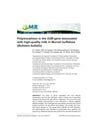 28 citations,
April 2010 in “British Journal of Dermatology”
28 citations,
April 2010 in “British Journal of Dermatology” Genetic marker rs12558842 strongly linked to male hair loss.
 20 citations,
December 2013 in “Clinical and Experimental Dermatology”
20 citations,
December 2013 in “Clinical and Experimental Dermatology” Smoking and drinking worsened hair loss in men with genetic hair loss, while eating and sleeping habits didn't; genetics played a bigger role than environment in hair loss.
 16 citations,
November 2021 in “Antioxidants”
16 citations,
November 2021 in “Antioxidants” Managing oxidative stress might help treat low testosterone and related chronic diseases in aging men.
12 citations,
January 2018 in “Journal of Clinical Laboratory Analysis” Certain IL-18 gene variations may increase the risk of alopecia areata.
6 citations,
December 2015 in “International journal of immunopathology and pharmacology” AE can have varied symptoms and genetic causes, but zinc therapy helps.
 5 citations,
January 2017 in “Endocrinology”
5 citations,
January 2017 in “Endocrinology” Genetic defects in testosterone production can cause hormonal and developmental disorders, and more research is needed to understand androgen regulation and develop safer treatments.
 5 citations,
January 2016 in “Genetics and molecular research”
5 citations,
January 2016 in “Genetics and molecular research” Certain genetic variations in the A2M gene are linked to better milk quality in Murrah buffaloes.
 2 citations,
July 2023 in “Plant Disease”
2 citations,
July 2023 in “Plant Disease” Some maize lines resist stalk rot better due to specific genes and enzyme activities.
 2 citations,
June 2022 in “대한스포츠의학회지”
2 citations,
June 2022 in “대한스포츠의학회지” Anabolic steroids boost muscle growth, SARMs increase muscle mass and bone density without side effects, and myostatin inhibitors block a protein that stops muscle growth, but each has potential risks.
 2 citations,
January 2002 in “Hormone Research in Paediatrics”
2 citations,
January 2002 in “Hormone Research in Paediatrics” Molecular diagnostics help identify genetic defects causing endocrine diseases, improving diagnosis and treatment options.
1 citations,
November 2022 in “Animals” The research found specific genes and pathways that control fur development and color in young American minks.

PCOS has a strong genetic basis, but more research is needed to fully understand it.
 1 citations,
February 2013 in “InTech eBooks”
1 citations,
February 2013 in “InTech eBooks” Genetic mutations cause various hair diseases, and whole genome sequencing may reveal more about these conditions.
March 2024 in “Agriculture” CRISPR/Cas9 gene-editing shows promise for improving sheep and goat breeding but faces challenges with efficiency and accuracy.
 September 2023 in “The Journal of clinical endocrinology and metabolism”
September 2023 in “The Journal of clinical endocrinology and metabolism” Genetic risk for PCOS can affect children's growth, metabolism, and development from early life into adulthood.
 July 2023 in “Journal of Biomedical Science”
July 2023 in “Journal of Biomedical Science” Different people show different symptoms for genetic diseases because of how sensitive their bodies are to small changes in important factors.
 January 2023 in “Revista Paulista de Pediatria”
January 2023 in “Revista Paulista de Pediatria” A Brazilian male with IFAP syndrome has a unique genetic variant causing his condition.

The document concludes that the development of certain tumors is influenced by genetic background and that a specific gene modification can lead to tumor regression and reduced growth.
 September 1983 in “Journal of The American Academy of Dermatology”
September 1983 in “Journal of The American Academy of Dermatology” Experts discussed hair care, genetic hair defects, hair loss treatments, nail surgery, lupus treatments, skin infections, and cosmetic allergies.
 July 2019 in “International journal of contemporary medical research”
July 2019 in “International journal of contemporary medical research” Men with genetic hair loss are more likely to have abnormal blood lipid levels, especially if the hair loss is severe.
 174 citations,
November 2016 in “Cell stem cell”
174 citations,
November 2016 in “Cell stem cell” Different types of skin cells have unique genetic markers that affect how likely they are to spread cancer.
 98 citations,
June 2008 in “Human mutation”
98 citations,
June 2008 in “Human mutation” A genetic change in the EDAR gene causes the unique hair traits found in East Asians.
 93 citations,
June 2001 in “The Journal of Clinical Endocrinology and Metabolism”
93 citations,
June 2001 in “The Journal of Clinical Endocrinology and Metabolism” Certain genetic variations in the AR and ERβ genes can affect androgen levels in women.
 37 citations,
October 2021 in “Nutrients”
37 citations,
October 2021 in “Nutrients” Vitamin D might help regulate insulin in the body, but taking Vitamin D supplements doesn't clearly prevent or improve type 2 diabetes. More research is needed.
 21 citations,
November 2012 in “Plastic and Reconstructive Surgery”
21 citations,
November 2012 in “Plastic and Reconstructive Surgery” Both genetic and lifestyle factors significantly affect female hair loss.
 21 citations,
August 2011 in “Body Image”
21 citations,
August 2011 in “Body Image” Acceptance reduces hair loss distress and medical consultations; coping mechanisms increase them.
 20 citations,
June 2010 in “Genes and Immunity”
20 citations,
June 2010 in “Genes and Immunity” Blood tests can help understand the genetic differences in people with alopecia areata, including how severe it is and if it's inherited.
 14 citations,
April 2006 in “Expert Review of Dermatology”
14 citations,
April 2006 in “Expert Review of Dermatology” Antiandrogen therapy helps treat genetic hair loss.
 2 citations,
July 2019 in “PLOS ONE”
2 citations,
July 2019 in “PLOS ONE” Certain genetic variations are linked to higher liver enzyme levels in patients treated for chronic hepatitis C with specific drugs.
 1 citations,
April 2024 in “Science Advances”
1 citations,
April 2024 in “Science Advances” Female cuckoo color differences are linked to their unique genes and help avoid male harassment.


























